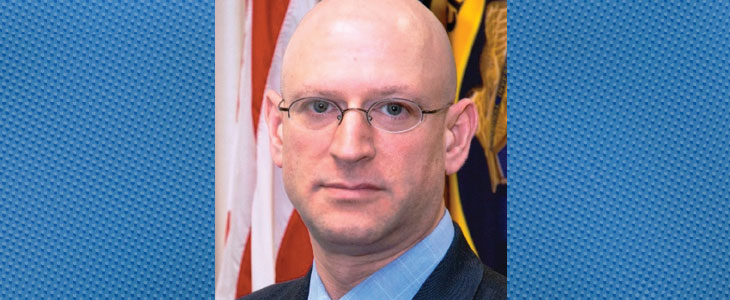
ACAMS Today had the opportunity to interview Richard Weber, Chief, IRS Criminal Investigation (CI), for the Internal Revenue Service Division, to discuss what financial institutions can do in the fight against sanctions, corruption, cyber-crime and much more.
Weber is responsible for investigating criminal violations of the tax code and related financial crimes. Headquartered in Washington, D.C., Weber oversees a worldwide staff of nearly 3,500 IRS-CI employees, including approximately 2,500 special agents, who are responsible for investigating crimes involving tax, money laundering, public corruption, cyber, ID theft, narcotics and terrorist financing.
Before joining IRS-CI, Weber was the Deputy Chief of the Investigation Division and Chief of the Major Economic Crimes Bureau in the Manhattan District Attorney’s office. In this position, he was responsible for managing prosecutors, investigators, analysts and paralegals handling investigations into securities and commodities fraud, large-scale mortgage and insurance fraud, Ponzi schemes, international money laundering, terrorist financing, sanctions evasion, asset forfeiture and tax crimes.
Weber previously served as Chief of the Asset Forfeiture and Money Laundering Section at the Department of Justice, and as an Assistant U.S. Attorney in the Eastern District of New York. Weber conducted numerous major money laundering investigations and prosecutions, including some of the largest forfeitures ever entered against financial institutions for sanctions violations.
In addition, Weber is a two-time recipient of the Attorney General’s John Marshall Award, the highest honor for Justice Department lawyers.
ACAMS Today: Coming out of law school, did you know you wanted to take the financial crimes prevention path or was it more of an organic growth and why?
Richard Weber: Since I was very young I wanted to be a detective. I always loved cop shows and pretending to be an agent. So I initially went to law school wanting to become a special agent. The road led me down the path of becoming a prosecutor and early in my career I started to work on cases that involved following the money and financial crime. I really enjoyed the work and found it to be very rewarding and challenging. I loved working with special agents and going after the bad guys who commit white-collar crimes and taking away their ill-gotten gains and property. I have great respect for the special agents who do this work—they are so incredibly skilled and dedicated to going through voluminous documents and piecing together a giant jigsaw puzzle in order to solve the crime and connect the dots. It was a dream of mine when I was a prosecutor to lead a law enforcement agency and I cannot be happier as the Chief of the best financial investigative agency in the world. It has been a sincere honor and privilege to serve as the IRS-CI chief for the past three years.
AT: How are financial institutions doing in detecting and reporting financial crime and what can they do to improve?
RW: For the most part, financial institutions are doing very well at detecting and reporting crimes and working collaboratively with the government. IRS-CI enjoys a great relationship with many institutions and we routinely have bank share forums where we discuss trends and completed investigations. The suspicious activity reports (SARs) that the banks file are value added and one of the most important law enforcement tools that we have in our arsenal.
It is clear to all who investigate financial crimes that the world of fraud is constantly evolving to generate new ill-gotten profits and to evade detection by law enforcement. Financial institutions play a critical role in the early detection of new schemes designed to defraud and launder money. They have made great strides in detecting these activities with strong Bank Secrecy Act and anti-money laundering (BSA/AML) programs and with the assistance of very complex technology.
The most effective tool that a financial institution has is a comprehensive “Customer Due Diligence program.” This program should not end with the account application, but rather continue until the account is closed. An effective customer due diligence (CDD) program will assist financial institutions greatly in detecting new schemes and will ensure that financial institutions are not being used unwittingly to launder proceeds of illegal activities.
And finally, I would like to thank the financial institutions who work so hard at preventing money laundering and other financial crimes—they truly serve as the first line of defense and IRS-CI appreciates their work and commitment to AML.
AT: Has public corruption increased in the past five years and what trends have you seen that FIs should be aware of?
RW: During the past five years, IRS-CI has initiated hundreds of public corruption investigations per year. While we have not seen an increase in corruption investigations during the last five years, we have seen significant cuts to our budget that drastically impact our ability to work these types of cases. IRS-CI is committed to the fight against public corruption and we will use our financial expertise to hold corrupt public officials accountable.
AT: What are the main challenges facing investigators when they investigate cyber-crime?
The ease with which cybercriminals can hide, anonymize, or further disguise their electronic trails on the Internet is probably the biggest challenge to investigators
RW: The ease with which cybercriminals can hide, anonymize, or further disguise their electronic trails on the Internet is probably the biggest challenge to investigators. A report last year estimated that nearly one-third of all computers may be infected with some type of malware. Every infected computer has the potential to be a proxy point for criminals to bounce their Internet connection making it difficult for law enforcement to identify the true source of a fraudulent transaction. In addition, the Darknet has become a driving force in the evolution of cyber-crime due to its sheer size (Darknet is 500x the size of the visible Web) and lack of indexing by search engines. Criminal services, tools and tactics are regularly advertised and shared on the Darknet. Its overwhelming size makes it difficult for law enforcement to identify—much less monitor—all criminal activity occurring.
AT: What advice can you give FIs on how to tackle cyber-crime?
RW: Ensure your enhanced due diligence (EDD) and know your customer (KYC) policies and procedures are solid and followed throughout your organization. Report all suspicious activities to law enforcement through SAR filings and be sure to include all electronic information (IP address, user agent, referral URLs) collected by your systems. Use multi-factor authentication to verify a customer’s identity when accessing account information. While some of this information may seem trivial, it is often the type of information that can point law enforcement in the right direction through a pattern of activity or activity seen across multiple financial institutions.
AT: What steps should FIs take to identify sanctions evasions?
RW: Again, a dynamic CDD program and Office of Foreign Assets Control (OFAC) compliance program is critical in early identification of customers who have sanctions levied against them. The USA Patriot Act addresses several aspects of due diligence including, verification of identification and special due diligence of correspondent and private banking accounts. Due diligence requires a financial institution to be alert for unusual transactions and to compare the account holder(s) and related transactions (wire transfers, letters of credit and non-customer transactions, such as funds transfers) to an updated OFAC list.
Below are some methods that U.S. individuals may use to evade U.S. sanctions.
U.S. clients creating sham corporations:
- Sham corporations used for this purpose are often formed in a country foreign to both the owner and the bank
- Corporation/entity is formed in a country other than where it is doing business
- The chairman or board of a corporation may show true ownership from U.S.
- A review of articles of incorporation may assist in identifying the true identity of the accountholders
U.S. clients masking the true identity of U.S. accountholders by creating trusts:
- The beneficiary of the trusts may indicate U.S. interest
- Review the source of the funds
Opening “numbered” Swiss bank accounts to shield identities, even from employees within the Swiss bank:
- Ensure the proper documentation is maintained when the accounts are formed
- KYC
AT: In your tenure at the IRS, what have you seen as common violations of the U.S. tax code?
RW: Tax-related identity theft has been the most prolific issue during my tenure. Since 2010, IRS has seen epidemic growth in identity theft. In response, IRS dedicated large amounts of resources to battle this priority and as a result, from 2011 through October 2014, IRS stopped 19 million suspicious returns and protected more than $63 billion in fraudulent refunds. IRS-CI remains on the front lines battling ID theft. In the past three fiscal years IRS-CI initiated over 3,400 ID theft investigations and over 1,400 individuals were sentenced with additional prosecutions awaiting final adjudication. Furthering our commitment, IRS-CI sponsored the nationwide Law Enforcement Assistance program, which provides for the disclosure of federal tax return information for use in prosecutions at the state and local law enforcement levels. There are now more than 860 state/local law enforcement agencies from 48 states participating. In fiscal year 2014, more than 6,776 requests for assistance were received from state and local law enforcement agencies. In January 2012, IRS-CI established a centralized Identity Theft Clearinghouse (ITC) to evaluate and refer identity theft refund fraud schemes to IRS-CI Field Offices for investigation. Since inception, the ITC has received over 7,600 individual identity theft leads involving over 1.47 million suspicious returns and over $6.8 billion in refunds claimed. IRS-CI also maintains a leading role and/or active role in over 75 multiregional task forces or working groups including state/local and federal law enforcement agencies solely focusing on identity theft as well.
AT: There was a recent, first of its kind BSI SA settlement announced earlier this year, what are some key points FIs should take from the investigation?
RW: The U.S. government will continue its efforts to root out offshore tax evasion. We will continue to pursue those who help facilitate tax evasion and those who use secret offshore accounts to evade taxes. With BSI, the U.S. government agreed not to prosecute them for tax-related offenses under Titles 18 or 26, United States Code, or for any monetary transaction offenses under Title 31, United States Code, Sections 5314 and 5322. In exchange for the non-prosecution, the bank agreed to the following terms:
- Make a complete disclosure of their cross-border activities;
- Provide detailed information on an account-by-account basis for accounts in which U.S. taxpayers have a direct or indirect interest;
- Cooperate in treaty requests for account information;
- Provide detailed information as to other banks that transferred funds into secret accounts or that accepted funds when secret accounts were closed;
- Agree to close accounts of account holders who fail to come into compliance with U.S. reporting obligations; and
- Pay appropriate penalties (in BSI’s case it was $211 million).
AT: Do you anticipate additional settlements this year?
RW: Yes.
AT: What is the best career advice you have received?
Always stay true to yourself and follow your gut
RW: I have been very fortunate in my career to have had some great mentors. One mentor told me early on to “always stay true to yourself and follow your gut.” I have also learned to surround myself with great colleagues that are part of my team. I try to work as hard as I can and stay focused on the mission—no matter how significant the challenge. I am so dedicated to IRS-CI and passionate about the work and the employees. If you do something that you love, it is easier to go to work every day. And finally, I think it is so important to balance work and family life. I have a 4-year-old son that is the most important part of my life and I try to ensure that I spend as much time with him as I can.










